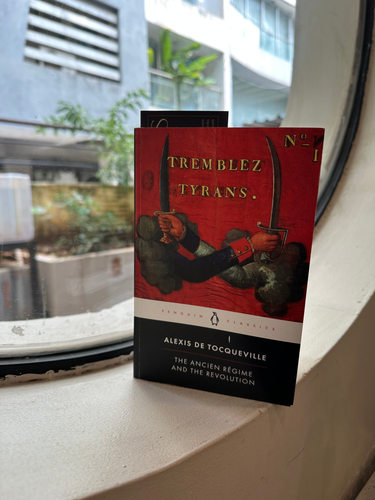booklog: The Ancien Régime and the French Revolution
In 2025 I read The Ancien Régime and the French Revolution by Alexis de Tocqueville.

Timeline
- Aug 13, 2025: started reading.
- Oct 30, 2025: finished reading.
Review
I was very interested in this history for a few reasons.
First, de Tocqueville is writing about the French Revolution in the aftermath of the 1848 Revolution and was serving in the 2ème République as it lapsed into empire — actions for which he was subsequently jailed. No matter how objective you try to be, experiences like this are bound to color your view of history. He’s also writing about the Revolution with no knowledge of the subsequent restoration of democracy in France. This book came out 14 years before the 3ème République would appear. (France is currently on its 5th Republic for those keeping score.)
Second, I wanted a better understanding of how this change was understood in the more immediate aftermath of the Revolution. De Tocqueville wasn’t alive during 1789, but he and his contemporaries lived in the long shadow of its consequences.
This context in mind, it turned out to be an instructive and rewarding read! He goes to great pains to demonstrate that characteristics of French government and administrative structure that are often credited to the Revolution were in fact established under the Ancien Régime; administrative centralization being a key example. Perhaps most eye opening was his (fairly convincing) argument that the Revolution was triggered not because the regime of Louis XVI was the most oppressive, but rather because its poorly executed reforms served to throw the injustice of the existing system into sharper relief.
De Tocqueville was a liberal, in the 19th c. sense, and the bias inherent in that framing shows up quite often in his characterizations and conclusions. However, it’s hard to hold that against him when he hits you with great aphoristic lines like:
Men who value only those material advantages from freedom have never kept it long.
As with much history from before the 20th c., sources and citations are not rigorous. At times he writes phrases like “I have held a secret document in my hand that stated…” and it’s hard not to arch an eyebrow. There are also some curious artifacts of the context in which it was written. For example, he refers to Napoleon Bonaparte several times, but never by name. Only using monikers like “the despot.” A rhetorical tic evokes parallels to some contemporary posting habits in the U.S.
As he nears the end of his argument you start to get a real sense of his bitterness at the failures of 1848 and his cynicism about France’s ability to govern itself democratically. I hadn’t planned to, but this final turn does make me interested in picking up a copy of his Souvenirs of 1848.
Details
- Publisher: Penguin Classics
- Page Count: 307
- ISBN: 9780141441641
<< shelf.